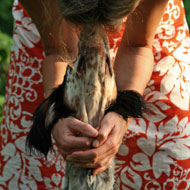Dog-owner bond similar to mother-infant relationship

"The human-dog relationship is exceptional because it is an interspecies form of attachment."
Dog owners often admit to loving their pet as much as (or even more than) members of their family. New research findings may explain this, suggesting eye contact between dogs and owners triggers the release of oxytocin, facilitating the same bonding process that occurs between a mother and her child.
A team of Japanese scientists believe dogs may have acquired human methods of communication during domestication.
According to their research, which has been published in the journal Science, mutual gazing between dogs and owners triggered a significant increase in urinary oxytocin, which is also known as the 'love hormone'.
Gaze is an important part of human communication, enabling us to interpret another's intention and also, crucially, to establish relationships, for example social attachment between mother and infant.
Eye contact between a mother and her child releases oxytocin, which drives bonding between the two and generates maternal behaviours.
Writing in Science, researchers said: "The human-dog relationship is exceptional because it is an interspecies form of attachment."
Dogs and owners involved with the Japanese study were urine tested before and after a 30 minute period of interaction with one another. Dogs were divided into two groups - 'long gaze' and 'short gaze'. Owners and dogs in the long gaze group showed a significantly greater increase in oxytocin levels.
The same experiment was also carried out on hand-reared wolves. This group rarely showed mutual gazing with their owners and oxytocin levels remained unchanged. This suggests mutual gazing as a form of communication between dogs and owners evolved during domestication.
Commenting on the findings in Science, the researchers wrote: "These results suggest that humans may feel affection for their companion dogs similar to that felt toward human family members and that dog-associated visual stimuli, such as eye-gaze contact from their dogs activate oxytocin systems."
For the full research report: www.sciencemag.org/content/348/6232/333.full



 The latest
The latest